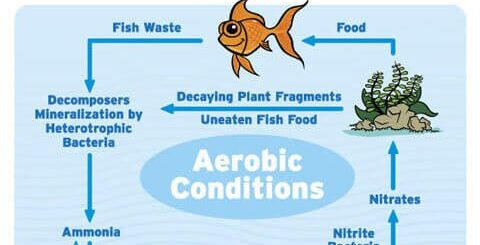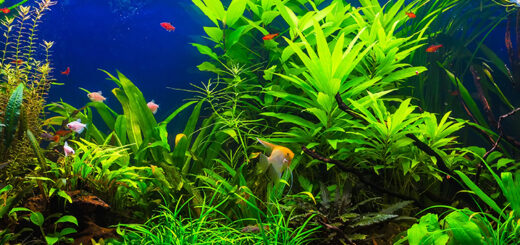Freshwater Vs. Saltwater Aquariums: Pros And Cons Explained
Are you considering diving into the world of aquariums but unsure whether to choose a freshwater or saltwater setup? Look no further! In this article, we will explore the pros and cons of both options to help you make an informed decision. Whether you’re a beginner or an experienced hobbyist, we’ve got you covered with all the essential information you need to know before taking the plunge. So, grab your snorkel and let’s embark on a fascinating journey into the captivating world of aquariums!
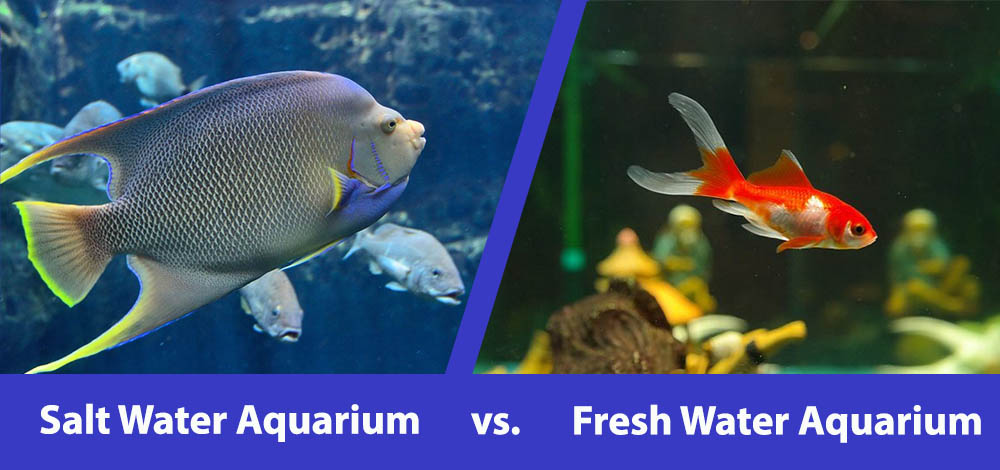
This image is property of www.hepper.com.
Click here…Your Spirit Animal is Trying to Connect…
Maintenance
Maintaining an aquarium is an essential part of keeping your fish healthy and happy. It involves regular cleaning, water changes, and monitoring various water parameters. Both freshwater and saltwater aquariums require maintenance, but there are some key differences to consider.
Freshwater Aquarium Maintenance
Freshwater aquariums are generally easier to maintain compared to their saltwater counterparts. One advantage is that there is no need for regular testing or adjustments to water salinity. Freshwater tanks typically require weekly water changes of about 10-25%, depending on the tank size and fish load. You will also need to regularly clean the filter, remove debris from the gravel, and trim any excessive plant growth. Overall, freshwater aquarium maintenance can be relatively straightforward and less time-consuming.
Saltwater Aquarium Maintenance
Saltwater aquariums, on the other hand, can be more complex and demanding to maintain. In addition to regular water changes, you will need to closely monitor water parameters such as salinity, pH, and calcium levels. Maintaining a stable saltwater environment requires more attention to detail and more frequent testing. Another aspect of saltwater aquarium maintenance is the care of live rock and sand, which need to be cleaned periodically to prevent algae growth. While the maintenance may be more involved, the stunning variety of marine life that can be kept in a saltwater tank makes it a worthwhile endeavor.
Start-up Cost
The initial investment in setting up an aquarium can vary depending on the size and the type of aquarium you choose. Freshwater and saltwater aquariums have their own unique start-up costs to consider.
Freshwater Aquarium Start-up Cost
Freshwater aquariums are generally more affordable to set up than saltwater aquariums. The equipment needed, such as tanks, filters, heaters, and lighting, can be purchased at a lower cost. Additionally, the fish and plant options for freshwater tanks tend to be less expensive compared to their saltwater counterparts. The overall start-up cost for a freshwater aquarium can range from around $100 to a few hundred dollars, depending on the size and complexity of the setup.
Saltwater Aquarium Start-up Cost
Saltwater aquariums typically have a higher start-up cost due to the additional equipment and specialized needs. Along with the basic equipment, such as tanks, filters, heaters, and lighting, you will need to invest in a protein skimmer, a high-quality marine salt mix, live rock, and sand. The cost of these additional components can significantly increase the overall start-up cost. Depending on the size and complexity of the setup, a saltwater aquarium can cost several hundred to a few thousand dollars to get started.
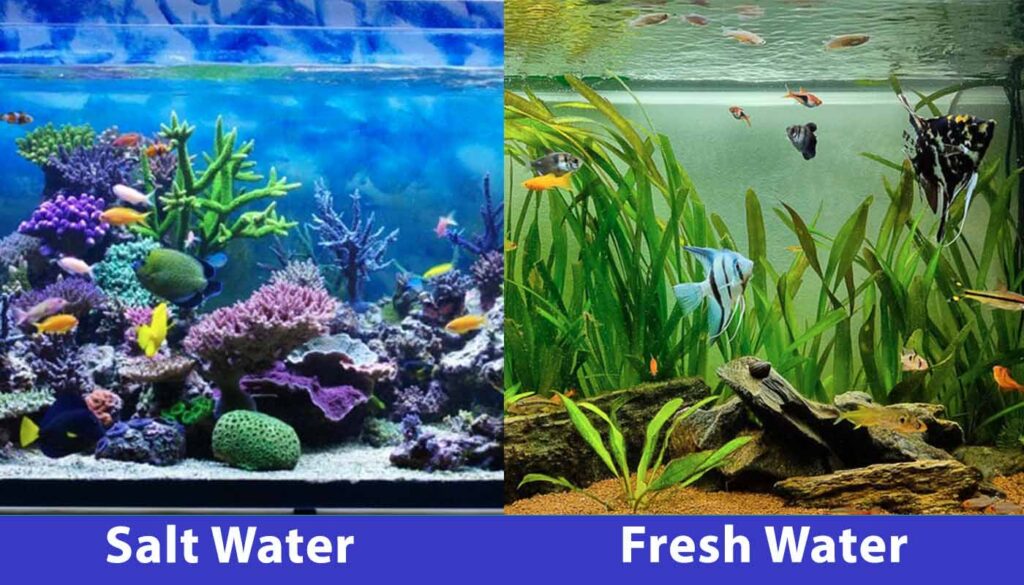
This image is property of www.hepper.com.
Click here…Your Spirit Animal is Trying to Connect…
Variety of Fish
The variety of fish you can keep in your aquarium is one of the most exciting aspects for many aquarists. Both freshwater and saltwater aquariums offer an incredible range of species, each with their own unique characteristics.
Freshwater Aquarium Fish Variety
Freshwater aquariums are teeming with a diverse array of fish species that can thrive in the freshwater environment. Species such as guppies, tetras, mollies, and angelfish are just a few examples of the beautiful and vibrant fish you can keep in a freshwater tank. Freshwater aquariums also offer the opportunity to keep a variety of plants, which can provide additional visual appeal and help maintain water quality.
Saltwater Aquarium Fish Variety
Saltwater aquariums boast an even wider selection of fish, with many species featuring stunning colors and intricate patterns. From vibrant clownfish and tangs to mesmerizing angelfish and damsels, there is no shortage of beautiful marine life to choose from. However, it’s important to note that certain species of saltwater fish may have specific dietary and environmental requirements, making them more challenging to care for compared to freshwater fish.
Color and Appearance
The color and appearance of the fish and the overall aesthetic of the aquarium are significant factors to consider when deciding between freshwater and saltwater setups.
Freshwater Aquarium Color and Appearance
Freshwater aquariums can be visually striking, with a wide range of vibrant fish and plants to choose from. While the coloration and patterns of freshwater fish may not match the vibrant hues found in some saltwater species, they can still be remarkably beautiful. Additionally, freshwater planted tanks can create a lush and naturalistic environment, often mimicking the habitats where these fish are found in the wild.
Saltwater Aquarium Color and Appearance
When it comes to color and appearance, saltwater aquariums have a reputation for showcasing some of the most visually stunning fish and coral species. The vivid colors and intricate patterns found in saltwater fish make them a true delight to observe. The addition of live rock and coral reefs further enhances the overall aesthetic and provides a captivating underwater ecosystem. If you are seeking a visually breathtaking aquarium with vibrant colors, a saltwater setup may be the ideal choice.

This image is property of i.visual.ly.
Ease of Setup
The ease of setting up an aquarium is an important consideration, especially for beginners or those with limited time and experience.
Freshwater Aquarium Ease of Setup
Freshwater aquariums are generally considered easier to set up, making them an excellent choice for beginners. The equipment required is relatively straightforward and readily available. The water parameters and maintenance routines for freshwater tanks are generally more forgiving, allowing for a smoother transition and less stressful start-up experience. With proper research and guidance, setting up a freshwater aquarium can be a relatively hassle-free process.
Saltwater Aquarium Ease of Setup
Saltwater aquariums require more specialized equipment and knowledge, making the setup process more complex. Achieving and maintaining the proper water parameters, such as salinity and pH, can be challenging for beginners. Additionally, the introduction and acclimation of live rock and sand, as well as the establishment of a healthy biological filtration system, require careful attention. While setting up a saltwater aquarium may be more time-consuming and demanding, the reward of creating a thriving marine environment can outweigh the initial difficulties.
Water Parameters
Water parameters play a crucial role in ensuring the health and well-being of your aquarium inhabitants. Understanding the specific water requirements for each type of aquarium is essential for maintaining optimal conditions.
Freshwater Aquarium Water Parameters
Freshwater aquariums generally have more forgiving water parameters compared to saltwater aquariums. The key parameters to monitor in a freshwater tank include temperature, pH level, ammonia, nitrite, and nitrate levels. Most freshwater fish and plants can tolerate a wider range of conditions, making it easier to maintain stability. Regular testing and adjustments are still necessary, but the margin for error is typically greater in a freshwater setup.
Saltwater Aquarium Water Parameters
Maintaining stable water parameters is critical for success with a saltwater aquarium. In addition to temperature and pH levels, salinity, and specific gravity play a vital role in the health of marine fish and coral. Regular testing and precise adjustments are necessary to ensure the water chemistry remains within the narrow tolerances of saltwater species. The addition of specialized equipment, such as protein skimmers and calcium reactors, may also be required to maintain optimal water quality for the inhabitants. Monitoring and maintaining these parameters can be more challenging and time-consuming compared to freshwater tanks.
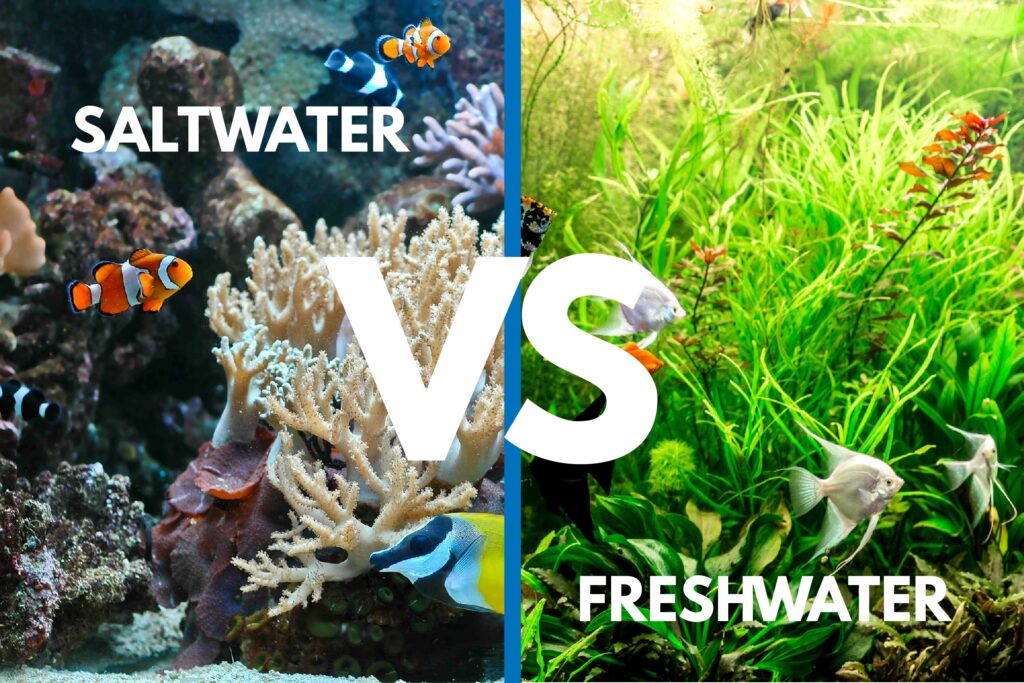
This image is property of www.buildyouraquarium.com.
Compatibility
Compatibility refers to the ability of different fish species to coexist peacefully in the same tank. Some fish are known to be more aggressive or territorial, which can be a determining factor in your choice of aquarium.
Freshwater Aquarium Compatibility
Freshwater aquariums offer a wide range of fish species that can coexist harmoniously. While there are still some aggressive or territorial freshwater species, careful selection and proper stocking can help minimize compatibility issues. Additionally, community tanks with a variety of fish species are popular in freshwater setups, as they can create a diverse and visually appealing display.
Saltwater Aquarium Compatibility
Saltwater aquariums present unique challenges when it comes to compatibility. Some saltwater fish are known to be highly territorial or aggressive, making it crucial to select tankmates that are compatible. Establishing a balanced ecosystem with appropriate hiding places and territories can help reduce aggression. However, it is essential to research and carefully plan the stocking of a saltwater tank to avoid potential conflicts among the inhabitants.
Ecosystem Maintenance
Maintaining a healthy and balanced ecosystem is vital for the overall well-being of your aquarium. Both freshwater and saltwater tanks require specific considerations for ecosystem management.
Freshwater Aquarium Ecosystem Maintenance
The ecosystem maintenance in a freshwater aquarium primarily revolves around maintaining water quality, controlling algae growth, and ensuring the health of fish and plants. Regular cleaning and water changes, as well as proper filtration and feeding practices, contribute to a balanced ecosystem. The presence of live plants can also aid in maintaining water parameters by consuming excess nutrients and providing natural hiding places for fish.
Saltwater Aquarium Ecosystem Maintenance
Achieving and maintaining a stable saltwater ecosystem is more complex and requires additional considerations. Proper maintenance of water quality, including monitoring salinity, pH, and nutrient levels, is crucial for the health of fish, coral reefs, and invertebrates. Marine tanks often require protein skimmers, UV sterilizers, and other specialized equipment to maintain water clarity and balance. Regular maintenance routines involving the cleaning and care of live rock, sand, and coral are necessary to prevent algae growth and ensure a thriving ecosystem.
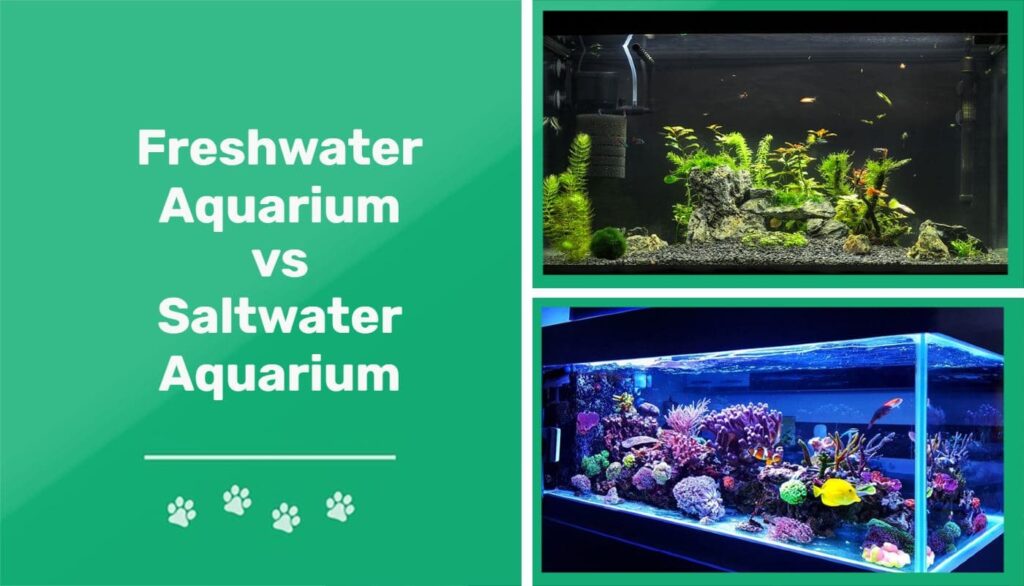
This image is property of petkeen.com.
Overall Cost
The overall cost of maintaining an aquarium goes beyond the initial start-up expenses. It includes ongoing costs for equipment replacement, fish and plant food, water testing kits, and general maintenance supplies.
Freshwater Aquarium Overall Cost
Freshwater aquariums generally have lower overall costs compared to saltwater setups. This is primarily due to the lower cost of equipment, fish, and plant options. The ongoing costs for freshwater tanks typically include the cost of electricity, water conditioners, food, and periodic replacement of filtration media. While prices may vary depending on the size and complexity of the setup, freshwater aquariums can be more budget-friendly in the long run.
Saltwater Aquarium Overall Cost
Saltwater aquariums tend to have higher overall costs due to the more expensive equipment, marine-specific supplements, and the need for specialized lighting systems. The investment in live rock, coral, and other marine invertebrates also contributes to the higher cost. Additionally, the maintenance of stable water parameters may require the use of additives and supplements that can be more expensive than those used in freshwater tanks. It’s important to factor in these ongoing costs when considering a saltwater aquarium.
Level of Expertise
The level of expertise required to maintain a successful aquarium is an important consideration, especially for beginners or those with limited experience in this hobby.
Freshwater Aquarium Level of Expertise
Freshwater aquariums are generally considered more beginner-friendly and require less expertise compared to saltwater setups. The forgiving nature of freshwater fish and plants, along with the simpler water chemistry, makes it easier for beginners to achieve success with their tanks. With proper research, education, and guidance, even those new to the hobby can quickly become proficient in maintaining a healthy freshwater aquarium.
Saltwater Aquarium Level of Expertise
Saltwater aquariums, with their complex water chemistry and specialized requirements, demand a higher level of expertise. A thorough understanding of salinity, pH levels, and the biological processes in a marine environment is crucial for maintaining the health of saltwater fish, corals, and invertebrates. Additionally, the handling and acclimation of live rock, coral, and marine life require careful attention. Beginners are encouraged to acquire knowledge, seek guidance, and gradually build their expertise before venturing into a saltwater aquarium.



